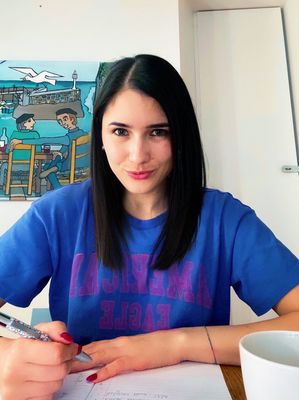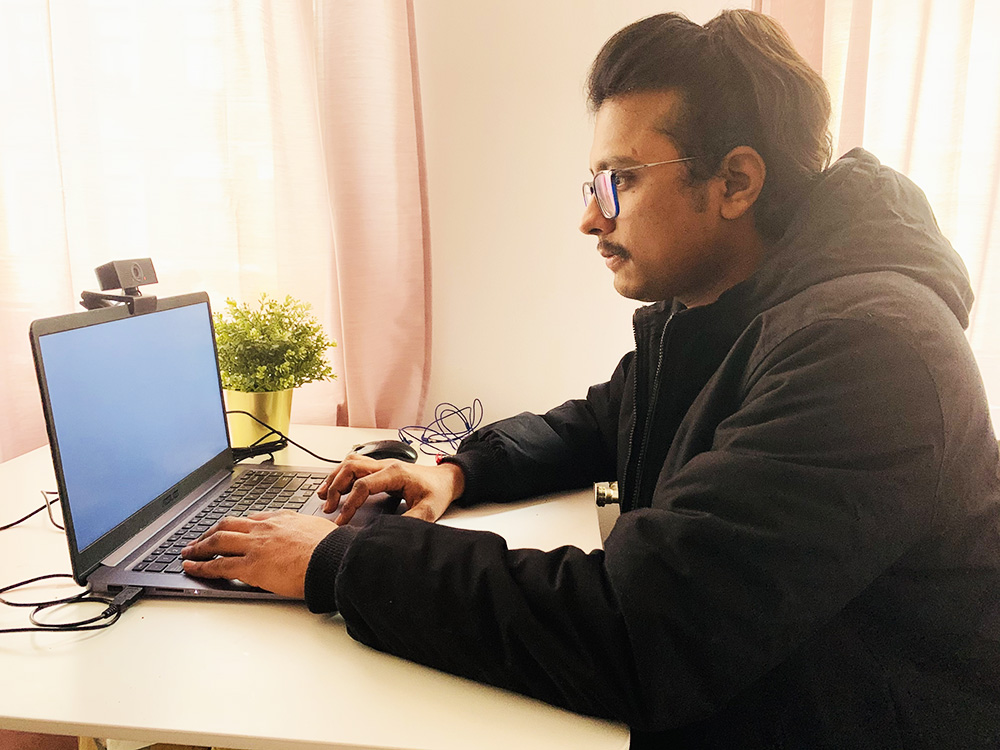
German and American students learn to build bridges together
When Nevina Cabboi and Pruthvirajsinh Jhala heard about it, they immediately wanted to participate: through the "Virtual Exchange+" DAAD project, the Harz University of Applied Sciences, in cooperation with the Ruhr West University of Applied Sciences, offered a range of units, in which German students studied together with American students, for the first time in the winter semester 2020/2021. And they did so virtually. The management was also international: each unit was with a lecturer from the Harz University of Applied Sciences and a lecturer from the American partner universities Wayne State University, Iowa State University or Michigan State University.
"That was my chance for a student exchange in the USA," says Nevina Cabboi. She is studying European Administrative Management at the Halberstadt Faculty of the Harz University of Applied Sciences. She chose the degree programme primarily to gain experience in other countries. This is easy within Europe, but the journey across the Atlantic – her big dream – was difficult for her financially. "That's why a place in the project was so important for me," says Nevina Cabboi.

Nevina Cabboi exchanged views with her fellow students on the topic of "Cultural Awareness".
"What diet will look like in the next 20 years for the subject Technology Assessment and Sustainability" was the question for the international virtual unit of master's student Pruthvirajsinh Jhala. He has been enrolled in the English-language Technology and Innovation Management degree programme since March 2020 and, as an international student from India, at least did not have to make a change linguistically.
"The main interest of this assignment was learning about how to do a PESTEL analysis for any given current world problem or current megatrends and assess the future trends and movement in the next twenty years," says the student regarding his rather professional motivation to take part in the unit.
In three faculties...
…the courses are offered as part of the Virtual Exchange+ project. In the winter semester 2020/2021, students at the Faculty of Administrative Sciences (with Prof. Dr. Katja Michalak on the topic of "Cultural Awareness") and at the Faculty of Automation and Computer Science (with Prof. Dr. Andrea Heilmann on the topic of "Sustainability in Technical Innovations") have already benefited – each in exchange with students from Wayne State University.
And what was it like to study completely virtually? Uncomplicated, according to both. The lecturers provided material for preparation. The lectures were given via a video conferencing platform, which also allowed group work in breakout sessions. "There was no strangeness at all, I had the feeling the whole time that we had already met," says Nevina Cabboi, who considers herself more of an analogue person. "From time to time it turns out to be a little difficult to collaborate with everyone, due to different time zones and because a few students were working part-time/full-time," notes Pruthvirajsinh Jhala, who has also prepared a final presentation with his fellow students.

The international perspective has been an integral part of teaching since the founding of the Harz University of Applied Sciences. With the "Virtual Exchange+" DAAD project it has taken on a new, digital dimension. With the "Internationalisation@Home” programme, even more students could benefit from student exchanges in the future – which is the hope of Prof. Dr. Louisa Klemmer, head of the project and Vice President for Academic and International Affairs.
Nevina Cabboi, who already has a journalistic education in her pocket and would like to work as a correspondent abroad after her studies, already feels well prepared: "I was able to experience how people from different nations react to an everyday situation or perceive things differently and have learned how to bridge inter-cultural differences. That was very valuable."
The "Virtual Exchange+" project has been funded by the Federal Ministry of Education and Research (BMBF) for 13 months since September 2020. The consortium based around the Ruhr West University of Applied Sciences and the Harz University of Applied Sciences prevailed among more than 100 applicants in the programme from the German Academic Exchange Service (DAAD) "International Virtual Academic Collaboration (IVAC)".
If you would like to exchange ideas with virtual exchange students via social media, you can find out more here: www.instagram.com/virtualexchange_mission
10.02.2021
Author: Claudia Aldinger
Image author: © Harz University
Image rights: © Harz University